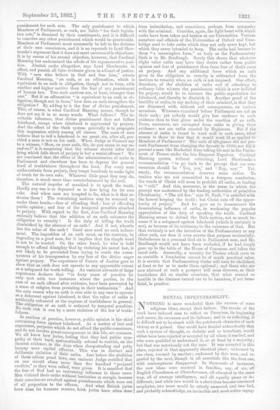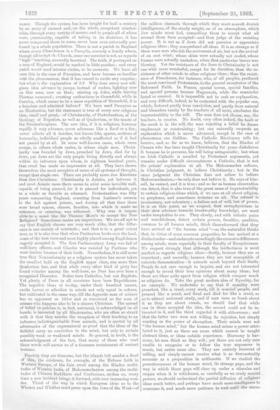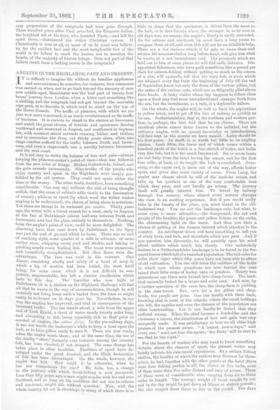MENTAL IMPENETRABILITY.
NOTHING is more wonderful than the success of some religious ideas, except their failure. The events of the week have induced men to reflect on Puseyism, its beginning and career, its successes and its failures; and in so reflecting, it is difficult not to be struck with the patchwork character of such victory as it gained. One would have fancied antecedently that such a system of thought, so definite and so trenchant, would either have been rejected or accepted by all whom it reached, and who were qualified to understand it, or at least by a majority ; but that was notoriously not the case. It was accepted in this place, rejected in that apparently identical place; welcomed by one class, scorned by another ; embraced by this man, and re- garded by the next, though in all essentials like the first one, with contemptuous disapproval. In thousands of instances, the new ideas were received in families, say, of six, all English Churchmen or Churchwomen, all educated in the same way, all of average intelligence, and all equally pious or in- different; and while two would in a short time become convinced neophytes, two more would be utterly unmoved, and two feel, and probably acknowledge, an invincible and most active repug. stance. Though the system has been taught for half a century by an army of earnest and, on the whole, competent mission- aries, through every variety of means, and to people all of whom were, presumably, capable of taking in its doctrines, it has never conquered them in mass, never been even externally pro- fessed by a whole population. There is not a parish in England where every Churchman is a Puseyite, scarcely a family where, though all accept th s C berth, some one member is not, as regards " high " teaching, avowedly heretical. The faith, if portrayed on a map of England, would be marked in little patches ; and every patch would need interior circles, to be accurate. We have all seen this in the case of Puseyiem, and have become so familiar with the phenomenon, that it has ceased to excite any surprise ; but .what is the explanation of it ? Why does every new reli- gious idea advance by jumps, instead of rnshes, lighting now on this man, now on that; stirring up John, while leaving Thomas unmoved ; creating enthusiasm in Greenfield, while in Cornlea, which seems to be a mere repetition of Greenfleld, it is a hopeless and admitted failure ? We have used Puseyism as an illustration, but the statement is true of every now religious idea, small and great,—of Christianity, of Protestantism, of the theology of Negation, as well as of Quakerism, or the tenets of the Swedeuborgians. The new idea, if it is religious, 'however rapidly it may advance, never advances like a flood or a fire ; never affects all it touches, but leaves bits, spaces, sections of humanity, individual people as wholly unaffected as if it had not passed by at all. In some well-known cases, whole races escape, in others whole castes, in others single men. Christ- ianity was founded by Jews, preached by Jews, died for by Jews, yet Jews are the only people living directly and always within its influence upon whom, in eighteen hundred years, that creed has made no impression at all. They have shown themselves the most receptive of races of all systems of thought, except that single one. There are probably more Jew Kantians than Jew Christians. Christianity is Asiatic, yet between it and most Asiatic races there seems to exist some invisible wall, capable of being pierced, for it is pierced for individuals, yet as a whole as durable as adamant. Protestantism was fifty years conquering England, counting from Latimer's sermon to the Act against priests, and during all that time there were broad spaces, classes, families, into which it made no entrance, or entering, was abhorred. Why was it impos- sible to a mind like Sir Thomas More's to accept the New Religion? Sometimes castes are impervious. We are all apt to say that English classes are very much alike, that the differ- ence is one mainly of externals ; and that is to a great extent true, as it is also true that when Puritanism broke over the land, some of the best-born and most highly placed among Englishmen eagerly accepted it. The first Parliamentary Army was full of well-born officers, and Charles was resisted by Puritans who were leaders because of their birth. Nevertheless, it is still more true that Nonconformity as a religious system has never taken the smallest hold on the English upper class, any more than Quakerism has, and that while every other kind of piety has found votaries among the well-born, no Peer has over been a recognised Dissenter. Dukes turn Catholics, but not Baptists. Yet plenty of Peers in all countries have been Republicans. The negative ideas of to-day, under their hundred names, excite horror or affection in minds not only equal in culture, but cultivated in the same way, till the Agnostic man of science has no opponent so bitter and so convinced as the man of soience who happens ale° to be a sincere Christian. The spread of belief in patches is, in fact, universal, is acknowledged on all hands, is lamented by all Missionaries, who are often so struck with it that they ascribe the reception of their teaching to an influence indistinguishable from miracle, and is quoted by all adversaries of the supernatural as proof that the ideas of the faithful carry no conviction to the mind, but only to certain possibly weak or weakened minds.. So general, in truth, is the acknowledgment of the fact, that many of those who read these words will accuse us of a tiresome restatement of ancient truisms.
Possibly they are tiresome, but the islands left amidst a flood of idea, the existence, for example, of the Hebrew faith in Western Europe, of the Jain creed 'among the Hindoo multi- tudes of Western India, of Mahomniedanism among the multi- tusks of Chinese Buddhists and Confucians, strikes us, every time a new incident brings it forward, with ever increasing svori- der. Think of the way in which European ideas as to the Whence and Whither must press upon the Jews of the West—of
the million channels through which they must assault Jewish intelligences, of the steady weight, as of an atmosphere, which Jew minds must feel, compelling them to accept what all around them have accepted—and then judge of the resisting power. It is not as if Jews did not perceive or appreciate religious ideas ; they comprehend all ideas. It is as strange as if there were men who felt the movement of air, but not the arrival of an east wind; whose skins were actually not cooled, whose frames were actually unshaken, when that particular breeze was blowing. Yet the resistance of the Jews to Christianity is not one whit more wonderful, except for its duration, than the re- sistance of other minds to other religious ideas ; than the resist- ance of Frenchmen, for instance, who, of all peoples, produced the most convinced Protestants, to the general acceptance of the Reformed Faith. In France, special towns, special families, and special persons became Huguenots, while the remainder hated or sneered. It is impossible not to seek an explanation, and very difficult, indeed, to be contented with the popular one, which, fostered partly from conviction, and partly from natural and blameless vanity by the teachers of all sects, attributes the impenetrability to the will. The man does not choose, say, the teachers, to receive. No doubt, very often indeed, the fault or the merit is in the will, the man rejecting a belief he deems unpleasant or constraining ; but one naturally suspects an explanation which is never advanced, except in the case of phenomena one dislikes. The Catholic Missionary tells his hearers, and, as far as we know, believes, that the Hindoo of Camara, who has been taught Christianity for years disbelieves it because he is perverse, his will being antagonistic ; but when an Irish Catholic is assailed by Protestant arguments, yet remains under difficult circumstances a Catholic, that is not the priests' explanation at all. The Mahommedan refuses, in Christian judgment, to believe Christianity ; but in the same judgment the Christian does not refuse to believe Mahornmedanism,—he only does not believe it. He says of hims self, he cannot, and it is true ; and so far as human observation can detect, that is also true of the great mass of impenetrability to certain religious ideas which, if we care at all about religion, so perplexes, and sometimes irritates us all. The refusal is involuntary, not voluntary ; a failure not of will, but of power. It is on this point, as we suspect, that metaphysicians in their slow advance towards trustworthy knowledge, are most under temptation to err. They slowly, and with infinite pains and watchfulness, detect certain powers, faculties, qualities, common to all human minds, think thenceforward that they have arrived at "the human mind "—as the naturalist thinks that, in virtue of some common properties, he has arrived at a distinct order—and underrate exceedingly the excessive differences among minds, more especially in their faculty of Receptiveness We suspect strongly that although the leatheriness is most marked as regards religious ideas—firstly, because they are so important ; and secondly, because they are not susceptible of concrete demonstration—it extends much beyond, their limits. People do not care enough to inquire, and are not interested enough to reveal their true opinions about many ideas; but there are ideas quite apart from religion which conquer much as religions do. Take the great modern idea of Equality, for an example. We undertake to say that if equality were preached, like a creed, every week, till it wearied people, and pressed like a creed, and lived and died for like a creed, so as to attract universal study, and if men were as frank about it as they are about creeds, we should find that while one in three accepted the idea, the second could not be in- terested in it, and the third regarded it with abhorrence ; and that the latter two were not willing its rejection, but simply wanting in the power of absorption. Their minds were not "the human mind," but the human mind minus a power attris buted to it, just as there are races which cannot be taught abstract ideas, or ideas outside experience. Harmony is har- mony, let men think as they will; yet there are not only men unable to recognise or to follow the true sequences in music, but entire races also. They are entirely innocent of willing, and simply cannot receive what is as demonstrably accurate as a proposition in arithmetic. If we studied the powerlessnesses of the human mind, its strange gaps, and the way in which those gaps will close up under a stimulus and reopen when it is withdrawn, as carefully as we study mental powers, we should understand the partial diffusion of religious ideas mush bettor, and perhaps have much more intelligence to overcome it, and much more patience to wait until the slues-
sary preparation of the receptacle had been gone through. Three hundred. years after Paul preached, the Emperor Julian, the brightest wit of his time, who founded Paris,—and left his spirit there,—disbelieved the °atilt Christian system. If Christianity is trim at all, as most of us in some way believe, by far the saddest fact and the most inexplicable fact of the world is its failure to reach the brains, not to mention the hearts, of the majority of human beings. Does not part of that failure result from a lacking power in the receptacle ?
































 Previous page
Previous page